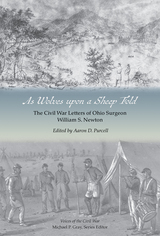
William S. Newton (1823–1882) served the Union primarily as an assistant surgeon with the 91st Ohio Volunteer Infantry, but also spent a few months as acting surgeon with the 2nd Virginia Cavalry (US). Toward the end of the war, he was promoted to surgeon for the 193rd Ohio Volunteer Infantry. Newton’s units fought in the Appalachian Highlands, mostly in Virginia and West Virginia. He treated wounded soldiers after significant battles including Opequon and Cedar Creek. In May 1864, following the Battle of Cloyd’s Mountain, John Hunt Morgan’s Raiders captured Newton and other medical personnel. After three weeks, Newton and his fellow prisoners were given the option of either treating Confederate soldiers or going to Libby Prison; they chose the latter. Newton spent only three days at Libby Prison before being released, but the experience took a significant toll on his health.
The letters in this volume, addressed mostly to Newton’s wife, Frances, provide a window into fighting in the Appalachian borderlands, where the differences between battle, guerilla warfare, and occupation were often blurred. As a noncombatant, the doctor observed life beyond troop movements and the brutality of war. Newton’s detailed letters cover his living quarters, race relations, transportation and communication, the comfort of a good meal, and the antics of his teenage son Ned. This book provides new insights into the medical and social history of the war, the war in Western Virginia, local and regional history, the perspective of a noncombatant, life on the home front, and the porous lines between home and battlefront.

Drawing upon the unique public and private papers of Ting Jih-ch’ang, Governor of Kiangsu, 1868–1870, this work examines the implementation of post-Taiping T’ung-chih Restoration programs in that province. The restoration of local order and rectification of society, judicial administration, fiscal affairs, and personnel problems are described against a background of continuous struggle for dominance in the countryside between local government on the one hand and the local elite on the other.
Jonathan Ocko demonstrates that the declining quality of local officials resulted in an erosion of public capacity, in particular of the government’s fiscal efficiency, and sharpened the moral dilemmas of office holding. Ocko’s close look at the provincial and local levels of administration and at the day-to-day problems faced by Ting Jih-ch’ang illuminates the frustrations and failures of the reform process.

In Lost in Transition: Removing, Resettling, and Renewing Appalachia, Aaron D. Purcell presents a thematic and chronological exploration of twentieth-century removal and resettlement projects across southern Appalachia. The book shares complex stories of loss and recollection that have grown and evolved over time.
This edited volume contains seven case studies of public land removal actions in Virginia, Kentucky, the Carolinas, and Tennessee from the 1930s through the 1960s. Some of the removals include the Tennessee Valley Authority and the Norris Basin, Shenandoah National Park and the New River, the Great Smoky Mountains National Park, and the Keowee-Toxaway Project in northwestern South Carolina. Each essay asks key questions: How did governmental entities throughout the twentieth century deal with land acquisition and removal of families and communities? What do the oral histories of the families and communities, particularly from different generations, tell us about the legacies of these removals? This collection reveals confrontations between past and present, federal agencies and citizens, and the original accounts of removal and resettlement and contemporary interpretations. The result is a blending of practical historical concerns with contemporary nostalgia and romanticism, which often deepen the complexity of Appalachian cultural life.
Lost in Transition provides a nuanced and insightful study of removal and resettlement projects that applies critical analysis of fact, mythology, and storytelling. It illustrates the important role of place in southern Appalachian history. This collection is a helpful resource to anthropologists, folklorists, and Appalachian studies scholars, and a powerful volume of stories for all readers who reflect upon the importance of place and home.
READERS
Browse our collection.
PUBLISHERS
See BiblioVault's publisher services.
STUDENT SERVICES
Files for college accessibility offices.
UChicago Accessibility Resources
home | accessibility | search | about | contact us
BiblioVault ® 2001 - 2024
The University of Chicago Press









